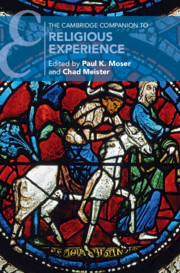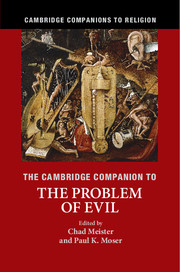31 results
Preface
-
- Book:
- The Cambridge Companion to Religious Experience
- Published online:
- 20 June 2020
- Print publication:
- 16 July 2020, pp xiii-xiv
-
- Chapter
- Export citation
Part I - Characterizing Religious Experience
-
- Book:
- The Cambridge Companion to Religious Experience
- Published online:
- 20 June 2020
- Print publication:
- 16 July 2020, pp 23-96
-
- Chapter
- Export citation
Figures
-
- Book:
- The Cambridge Companion to Religious Experience
- Published online:
- 20 June 2020
- Print publication:
- 16 July 2020, pp ix-x
-
- Chapter
- Export citation
Introduction
-
-
- Book:
- The Cambridge Companion to Religious Experience
- Published online:
- 20 June 2020
- Print publication:
- 16 July 2020, pp 1-22
-
- Chapter
- Export citation
Copyright page
-
- Book:
- The Cambridge Companion to Religious Experience
- Published online:
- 20 June 2020
- Print publication:
- 16 July 2020, pp vi-vi
-
- Chapter
- Export citation
Part II - Religious Experience in Traditional Monotheism
-
- Book:
- The Cambridge Companion to Religious Experience
- Published online:
- 20 June 2020
- Print publication:
- 16 July 2020, pp 97-156
-
- Chapter
- Export citation
Part III - Religious Experience Outside Traditional Monotheism
-
- Book:
- The Cambridge Companion to Religious Experience
- Published online:
- 20 June 2020
- Print publication:
- 16 July 2020, pp 157-236
-
- Chapter
- Export citation
Index
-
- Book:
- The Cambridge Companion to Religious Experience
- Published online:
- 20 June 2020
- Print publication:
- 16 July 2020, pp 335-339
-
- Chapter
- Export citation
Contents
-
- Book:
- The Cambridge Companion to Religious Experience
- Published online:
- 20 June 2020
- Print publication:
- 16 July 2020, pp vii-viii
-
- Chapter
- Export citation
Part IV - Prominent Themes and Challenges
-
- Book:
- The Cambridge Companion to Religious Experience
- Published online:
- 20 June 2020
- Print publication:
- 16 July 2020, pp 237-334
-
- Chapter
- Export citation
Contributors
-
- Book:
- The Cambridge Companion to Religious Experience
- Published online:
- 20 June 2020
- Print publication:
- 16 July 2020, pp xi-xii
-
- Chapter
- Export citation

The Cambridge Companion to Religious Experience
-
- Published online:
- 20 June 2020
- Print publication:
- 16 July 2020
Part I - Conceptual Issues and Controversies
-
- Book:
- The Cambridge Companion to the Problem of Evil
- Published online:
- 05 July 2017
- Print publication:
- 09 June 2017, pp 9-144
-
- Chapter
- Export citation
Acknowledgments
-
- Book:
- The Cambridge Companion to the Problem of Evil
- Published online:
- 05 July 2017
- Print publication:
- 09 June 2017, pp xi-xii
-
- Chapter
- Export citation
Contributors
-
- Book:
- The Cambridge Companion to the Problem of Evil
- Published online:
- 05 July 2017
- Print publication:
- 09 June 2017, pp ix-x
-
- Chapter
- Export citation
Contents
-
- Book:
- The Cambridge Companion to the Problem of Evil
- Published online:
- 05 July 2017
- Print publication:
- 09 June 2017, pp vii-viii
-
- Chapter
- Export citation
Miscellaneous Endmatter
-
- Book:
- The Cambridge Companion to the Problem of Evil
- Published online:
- 05 July 2017
- Print publication:
- 09 June 2017, pp -
-
- Chapter
- Export citation

The Cambridge Companion to the Problem of Evil
-
- Published online:
- 05 July 2017
- Print publication:
- 09 June 2017
Copyright page
-
- Book:
- The Cambridge Companion to the Problem of Evil
- Published online:
- 05 July 2017
- Print publication:
- 09 June 2017, pp vi-vi
-
- Chapter
- Export citation
Part II - Interdisciplinary Issues
-
- Book:
- The Cambridge Companion to the Problem of Evil
- Published online:
- 05 July 2017
- Print publication:
- 09 June 2017, pp 145-266
-
- Chapter
- Export citation

